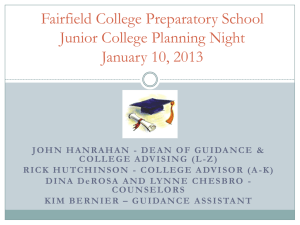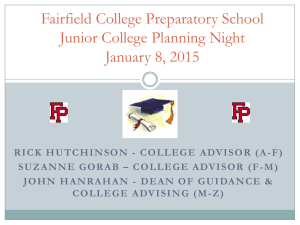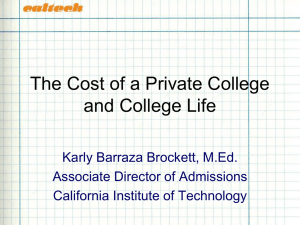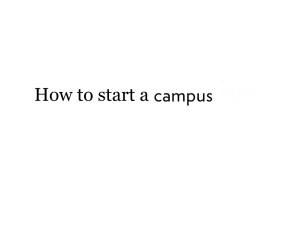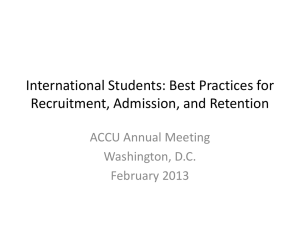Spring of Junior Year - Fairfield College Preparatory School
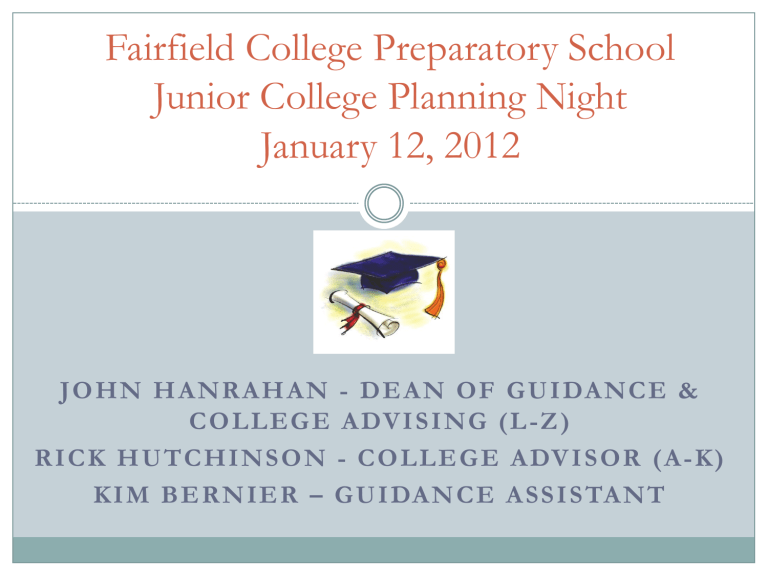
Fairfield College Preparatory School
Junior College Planning Night
January 12, 2012
JOHN HANRAHAN - DEAN OF GUIDANCE &
COLLEGE ADVISING (L -Z)
RICK HUTCHINSON - COLLEGE ADVISOR (A-K)
KIM BERNIER – GUIDANCE ASSISTANT
Guidance Groups and Individual Meetings
•
•
•
•
Fall of Junior Year:
Overview of the Junior Year
Standardized Testing– overview and strategy
Identifying Appropriate Colleges
Naviance
Identifying Colleges
My Game Plan
My resume
Guidance Groups and Individual Meetings
•
•
•
•
•
•
•
•
Spring of Junior Year:
Standardized Testing
Key Factors in Admission
Resume
Campus Visits /Fairfield Regional
College Fair, Date/Location: TBD
**Junior Interview – with advisor**
Senior Course Selection
Summer Strategies
Admission Glossary
Guidance Groups and Individual Meetings
Topics for Fall Senior Year:
•
•
•
Check-In Meeting with College Advisor
Finalizing Application Strategy
Coordination of Application process: application forms, essay (s), recommendations, sending testing to colleges
NAVIANCE
Research and develop prospective college lists: https://connection.naviance.com/fairfieldprep
•
•
Students:
Username/email : students’ Prep email address
Password: student created
•
Parents:
Accounts established for all parents
College Planning Resources
www.fairfieldprep.org
Naviance and the College Advising Page in the Guidance Section on the Prep website provides information on:
Interviewing
Factors in College Admission
Glossary of College Admission Terms
Resume models
SAT/ACT testing dates & deadlines
Evaluating a Transcript
Course of Study
5 core subjects: English,
Math, Science, Social
Science, Foreign
Language
Grade Trends
→ Most challenging course load that the student can manage.
→ Limited # of “lighter” electives.
→ Junior year, 1 st quarter senior year and 1 st semester senior year are key.
Standardized Testing
*Students register themselves for all SAT and/or ACT exams.*
SAT (SAT I) www.collegeboard.com
•
•
At least once in spring Junior Year (Jan., March, May, June)
At least once in fall Senior Year (Oct., Nov., Dec.)
SAT Subject Tests (SAT II)
•
•
Some colleges may require (see websites)
Can highlight an academic strength
ACT www.act.org
•
•
Spring Junior year dates: Feb., April, June
Fall Senior year dates: Sept., Oct., Dec.
“Tip” Factors
Teacher/Counselor Recommendations: Highlight individual academic strengths and personal qualities
•
•
Essay(s):
Reveals self
“Show, Don’t Tell”
•
Significant activity(ies):
Will show depth and commitment to personal interests and growth.
“Tip” Factors
(Continued)
Athletic recruitment
Special talents or attributes – how to highlight?
Interview (admission counselor, current student or alumni)
Supplemental letters (use sparingly)
Demonstrated Interest
Essays (From Common App. Supplements)
Application options and strategies
Regular Decision
Early Action
Early Decision
Rolling Decision
(w/ priority dates)
Finding a College “Fit”
Prospective College List: Personal Preferences
Size (# undergraduates)
Geographic Location
Campus setting (urban, suburban, rural)
Academic focus
Areas of study
Facilities: Library, Research
Labs, etc.
Social Atmosphere
Campus Life, Sports, Arts
Religious affiliation
Support services
Cost
Financial Aid
Housing – 4 year guaranteed?
Diversity
(Ethnic,Geographic)
Admission Criteria
Graduation +Retention
Rates
Outcomes: employment and graduate schools
Greek system
Prospective College List:
Other Resources
Friends and Relatives
Guide books
Rankings
College Advisor
Alumni
Honors and accreditations
Name Prestige
**Consider many different types of institutions. Do not always go with the pack.
Break new ground in the search process. **
Search List
Up to 15-20
Research (beware increasing selectivity)
Place in 5 Categories (as designated in
Naviance): Far Reach, Reach, Possible, Likely and Safety
Use Naviance Scattergrams as a guide, but not as an absolute.
Final Application List
Up to 10 (+/-)
Fairfield Prep Average: 8
Prioritize the list
Only a “safety” school if you would attend.
Contact (i.e. demonstrated interest) is more important with small/medium schools.
The Campus Visit
Campus Visit Options
•
•
•
•
•
•
•
•
Campus Tour
Information session
Open House/Special Event
Sit in on a class
Interview
Athletic visit
Overnight
Shadow student
Why is the Campus Visit Important?
Demonstrates YOUR interest
Experiencing the campus to help decide if you want to apply.
Find the institutions that are the right “Fit”.
Preparing for the Campus Visit
•
•
•
•
•
•
Visit college website to explore visit options.
Do your homework before the visit
Make reservations/appointments for campus tours, interviews, open houses and meetings with faculty or coaches.
Stick to the Office of Admission schedule
Avoid the Drive-Thru visit, if possible
Always sign in…Smaller colleges tend to track this information
(i.e. Demonstrated Interest)
What to look for while on campus
General University/College Information
*Read a Campus Newspaper*
Campus Life
•
Residence halls, cafeteria, parking, student center, chapel
Student Life/Athletics
•
Clubs & organizations, social life, recreation facilities, visual/performing arts, varsity athletics
Academic Life
•
Classrooms, professors, course offerings, internships, research opportunities
College Planning Checklists
College Planning: Spring of Junior Year
Initial Student/Advisor College Planning Meeting
Research: Web -based resources are best
Contact institutions
Visit Campuses
Attend spring open house programs
Standardized Testing - first/second round
Attend local/regional college fairs
Consider teacher recommenders
Develop an Activities Resume (excellent document to present at an interview)
Initial contact with athletic coaches etc.
College Planning: Summer before Senior Year
Campus Visits
Refine list
Consider application options: Regular, EA, ED, Rolling
Establish Common Application Account after August 1 st .
Determine what application and/or supplement forms each school requires. (i.e. common application)
Start filling out applications
Begin first draft of essay(s).
Continue to develop an activities resume .
College Planning: Fall of Senior Year
Check-In Meeting with College Advisor
Meet admission representatives who visit Fairfield Prep
Ask teachers to write recommendations.
Parent/Family Recommendation to Counselor
Attend College Fairs and Information Night programs
Finalize essays and applications
Final campus visits (tours, interviews, overnights, class visits, open houses)
Standardized Testing – final round
Check merit scholarship requirements and deadlines.
FAFSA/CSS Profile – Financial Aid instruments
Trends in Admission
Test Optional Colleges
Fast Track/Priority Applications
Demonstrated Interest – particularly in schools deemed “safeties”
Interview (smaller colleges) re-emergence
“Authenticity”
More Writing on Common Application Supplements
Public School interest on the rise
Requests for Financial Aid rising
Useful Web Sites
www.collegeboard.com
https://connection.naviance.com/fairfieldprep/ www.commonapp.org
www.fafsa.ed.gov
www.act.org
www.ncaa.org
Miscellaneous Thoughts…
Encourage student to stay in contact with the College Advising
Office. Communication is essential.
Allow ample time (2 + months) for essay writing.
Discern all requirements of your list early (Standardized testing requirements, supplements, essays, deadlines, etc.).
jhanrahan@fairfieldprep.
org 203-254-4200 ext 2238 (L-Z) rhutchinson@fairfieldprep.org
ext. 2502 (A-K) kbernier@fairfieldprep.org
ext. 2437
